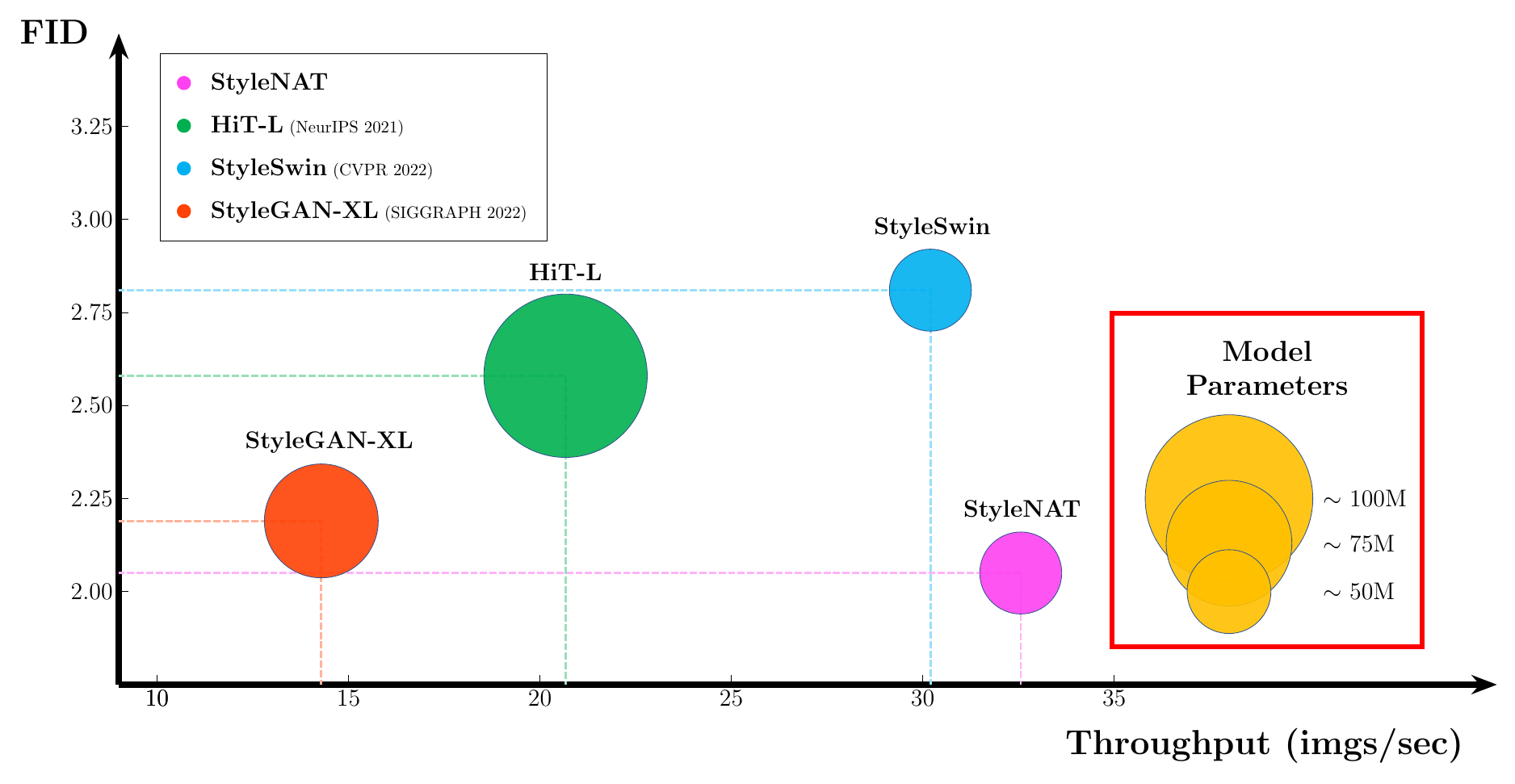Authors: Steven Walton, Ali Hassani, Xingqian Xu, Zhangyang Wang, Humphrey Shi
 StyleNAT is a Style-based GAN that exploits Neighborhood
Attention to
extend the power of localized attention heads to capture long range features and
maximize information gain within the generative process.
The flexibility of the the system allows it to be adapted to various
environments and datasets.
StyleNAT is a Style-based GAN that exploits Neighborhood
Attention to
extend the power of localized attention heads to capture long range features and
maximize information gain within the generative process.
The flexibility of the the system allows it to be adapted to various
environments and datasets.
Image generation has been a long sought-after but challenging task, and performing the generation task in an efficient manner is similarly difficult. Often researchers attempt to create a "one size fits all" generator, where there are few differences in the parameter space for drastically different datasets. Herein, we present a new transformer-based framework, dubbed StyleNAT, targeting high-quality image generation with superior efficiency and flexibility. At the core of our model, is a carefully designed framework that partitions attention heads to capture local and global information, which is achieved through using Neighborhood Attention (NA). With different heads able to pay attention to varying receptive fields, the model is able to better combine this information, and adapt, in a highly flexible manner, to the data at hand. StyleNAT attains a new SOTA FID score on FFHQ-256 with 2.046, beating prior arts with convolutional models such as StyleGAN-XL and transformers such as HIT and StyleSwin, and a new transformer SOTA on FFHQ-1024 with an FID score of 4.174. These results show a 6.4% improvement on FFHQ-256 scores when compared to StyleGAN-XL with a 28% reduction in the number of parameters and 56% improvement in sampling throughput.
| Dataset | FID | Throughput (imgs/s) | Number of Parameters (M) |
|---|---|---|---|
| FFHQ 256 | 2.046 | 32.56 | 48.92 |
| FFHQ 1024 | 4.174 | - | 49.45 |
| Church 256 | 3.400 | - | - |
We recommend building an environment with conda to get the best performance. We recommend the following build instructions but your millage may vary.
conda create --name stylenat python=3.10
conda activate stylenat
conda install pytorch torchvision cudatoolkit=11.6 -c pytorch -c nvidia
pip install -r requirements.txtNote: some version issues can create poor FIDs. Always check your build
environment first with the evaluate method. With the best FFHQ score you
should always get under an FID < 2.10 (hopefully closer to 2.05).
Notes:
-
Some arguments and configurations have changed slightly. Everything should be backwards compatible but if they aren't please open an issue.
-
This is research code, not production. There are plenty of optimizations that can be implemented easily. We also are obsessive about logging information and storing into checkpoints. Official checkpoints may not have all information as current code tracks due to research and development. Most important things should exist but if you're missing something important open an issue. Sorry, seeds and rng states are only available if they exist in the checkpoints.
Using META's hydra-core we can easily run. We simply have to run
python main.py type=inferenceNote that the first time you run this it will take some time, upfirdn2d is compiling.
By default this will create 10 random inference images with a checkpoint and the names will be saved as the name of the random seed.
You can specify seeds by using
python main.py type=inference inference.seeds=[1,2,3,4]If you would like to specify a set of seeds in a range use the following command
python main 'inference.seeds="range(start, stop, step)"'
If you would like to check the performance of a model we provide the evaluation mode type. Simply run
python main.py type=evaluationSee the config file to set the proper dataset, checkpoint, etc.
If you would like to train a model from scratch we provide the following mode
python main.py type=train restart.ckpt=nullWe suggest explicitly setting the checkpoint to null so that you don't accidentally load a checkpoint. It is also advised to create a new run file and call
python main.py type=train restart.ckpt=null runs=my_new_runWe also support distributed training. Simply use torchrun
torchrun --nnodes=$NUM_NODES --nproc_per_node=$NUM_GPUS --node_rank=$NODE_RANK
main.py type=trainThe confs directory holds yaml configs for different types of runs. If you would
like to adjust parameters (such as changing checkpoints, inference, number of
images, specifying seeds, and so on) you should edit this file. The confs/runs folder holds
parameters for the model and training options. It is not advised to modify these
files. It is better to copy them to a new file and use those if you wish to
train a new model.
There's a few unspecified hydra configs around wandb. We're just providing a
simple version. But we also support tags and description under this
argument.
@article{walton2022stylenat,
title = {StyleNAT: Giving Each Head a New Perspective},
author = {Steven Walton and Ali Hassani and Xingqian Xu and Zhangyang Wang and Humphrey Shi},
year = 2022,
url = {https://arxiv.org/abs/2211.05770},
eprint = {2211.05770},
archiveprefix = {arXiv},
primaryclass = {cs.CV}
}This code heavily relies upon StyleSwin which also relies upon rosinality's StyleGAN2-pytorch library. We also utilize mseitzer's pytorch-fid. Finally, we utilize SHI-Lab's NATTEN.
We'd also like to thank Intelligence Advanced Research Projects Activity (IARPA), University of Oregon, University of Illinois at Urbana-Champaign, and Picsart AI Research (PAIR) for their generous support.





